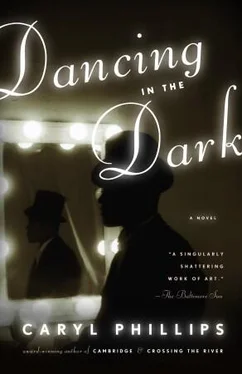They were hunting Negroes like you might pursue wild game, running up the avenues from south to north with sticks and bottles in their hands. It was merely another of those New York City nights when one small incident in a tavern or saloon sparked a response out of all proportion to the original event. Meanwhile, Bert remained hidden in his dressing room, the theater manager having barred the doors and turned off all the lights in the building. “You’ll be safe in here, Mr. Williams,” he said. “Shouldn’t be any problems for you in here.” And so Mr. Williams remained hidden inside the theater, and he was forced to listen to the ugly cacophony of the mob breaking glass and colored bones all over the city. George had already left the building, refusing to exercise any caution, scornful of such behavior. George was on a streetcar that was halfway up Sixth Avenue when three men recognized his immodest clothes, and then his well-groomed face, and they dragged the grinning nigger from the vehicle. “Walker!” The name began to be chanted by the hoodlums. “Walker!” “Walker!” Helpless to protect him, a half dozen horrified coloreds stood forlornly in the street and looked on, and then they parted like the Red Sea, forming an unfortunate path along which more ruffians were able to funnel their way toward the object of their hatred. “Walker!” They beat him with fierce blows until he fell over and bundled himself into a small ball, tucking his head down into his chest and protecting it on both sides with his folded arms.
George tries to open his eyes. One real coon. They have broken something, that much he is sure of, for he can feel that things are no longer in line. He will have to wait for help, but then again he is not in any hurry. He is just trying to get to his room at Marshall’s. Nothing wrong with a colored man enjoying some relaxation after a hard night’s work on Broadway. But tonight his fellow white citizens are angry, and although they have now abandoned him he can still hear their discordant and unruly clamor. And a half dozen blocks to the south, Bert hides in his dressing room with the lights out, his makeup already removed, his street clothes hanging neatly from his broad shoulders, ready to leave whenever America is ready to receive him. Ready to make his entrance without his makeup. But in the meantime he will wait until the theater manager informs him that his audience is ready for him. Then, and only then, will he be able to leave his dressing room.
The man from Dahomey stands in front of him and stares in disbelief. He looks at the mottled animal skin that is draped over Bert’s shoulder. He looks at the Indian axe that is tucked into Bert’s waistband, and at the headdress fashioned out of old leaves and pieces of twisted twig, which makes it appear as though Bert is wearing a crown of thorns. The man from Dahomey looks at the Chinese lettering that has been painted onto Bert’s face, and at the small Swiss bells that are strung together on a fraying piece of string and tied loosely around his ankles, but he says nothing to the American man about this costume. So this is America standing tall and proud before him. It never crosses his mind that this bizarre-looking man could possibly be representing Africa, let alone Dahomey, and against his better judgment the African begins to feel sorry for Bert. The man from Dahomey stands in front of Bert and stares in disbelief at this pitiful apparition and he worries about this strange land called America.
And then one morning Bert and George and the six others who are paid to dress in animal skins gather together, for the manager of the exposition wishes to address them. The gray-bearded man steps from his office and tucks his fingers into the pockets of his vest. Presumably they are now to hand back the skins and bells and axes, for after all it has been clearly understood that their engagement was to be temporary. It was to last until the Africans completed their journey from Dahomey and reached California, and now the Africans are here, and the prospect of unemployment is once again staring these eight young men in the face. The manager of the exposition begins to speak. They have done well and they are popular, but the problem is that the newly arrived savages don’t appear to be acclimating to the weather, or to the food, or to the customs. It is going to be too difficult to effectively season them and so they will soon be sent back to where they came from. Would these eight young impersonators of the dark continent be able to stay on for a few more weeks? As he makes his request he smiles and tugs at his vest, as though particularly pleased with himself.
. . .
He watches the Africans gather up their belongings and make ready to leave. There are a dozen of them, all men except two young women. He notices that they all walk slowly on bare, noiseless feet, and they seldom lift their eyes, as though stricken with some form of malady. The man who stood before him is clearly their leader, for they look to this man for guidance yet none among them ever approach him too closely. Evidently, they are tired, and Bert can only imagine how torturous their journey from Africa must have been. He too has suffered the tedium of a journey on a ship, but he understands that his own passage does not compare to the difficulties that these Africans must have endured. And then to finally arrive in San Francisco, only to discover that they are not wanted, and now they are being dismissed without payment, and they face the painful prospect of a long passage back to West Africa. No wonder they move slowly and without enthusiasm. Their lives have been arrested, and now they must return home empty-handed. And with how many promises broken? Nineteen-year-old Bert stands barefoot with a mottled animal skin draped over one shoulder, and he watches the melancholy men and women of Dahomey prepare for their departure.
IN DAHOMEY
1903
Jesse A. Shipp (1869–1934), book
Will Marion Cook (1869–1944), music
Paul Laurence Dunbar (1872–1906), lyrics
A Negro Musical Comedy
PROLOGUE
Time: Three months before beginning of play
Place: Dahomey
CHARACTERS
Je-Je, a Caboceer
CHARLES MOORE
Menuki, messenger of the king
WM. ELKINS
Moses Lightfoot, agent of Dahomey Colonization Society
W. BARKER
Shylock Homestead, called “Shy” by his friends
BERT A. WILLIAMS
Rareback Pinkerton, Shy’s personal friend and advisor
GEO. A. WALKER
Cicero Lightfoot, President of a Colonization Society
PETE HAMPTON
Dr. Straight … in name only, street fakir
FRED DOUGLAS
George Reeder, proprietor of an intelligence office
ALEX ROGERS
Henry Stampfield, letter carrier, with an argument against immigration
WALTER RICHARDSON
Me Sing, a Chinese cook
GEO. CATLIN
Hustling Charley, promoter of Get-the-Coin Syndicate
J. A. SHIPP
Leather, a bootblack
RICHARD CONNORS
Officer Still
J. LEUBRIE HILL
White Wash Man
GREEN TAPLEY
Messenger Rush, but not often
THEODORE PANKEY
Pansy, daughter of Cecilia Lightfoot, in love with Leather
ABBIE MITCHELL
Cecilia Lightfoot, Cicero’s wife
MRS. HATTIE MCINTOSH
Mrs. Stringer, dealer in forsaken Patterns, also editor of fashion notes in Beanville Agitator
MRS. LOTTIE WILLIAMS
Rosetta Lightfoot, a troublesome young thing Colonists, Natives, etc
.
ADA OVERTON WALKER
ACT I
SCENE I
(Public Square with a house doorway. Above the door is a sign. “Intelligence Office.” A crowd is assembled around a medicine show pitchman. Applause at rise of curtain. A banjo player acts as interlocutor as Tambo and Bones tell one or two jokes. The banjoist sings a song. Dr. Straight, the pitchman, addresses the crowd.)
Читать дальше












